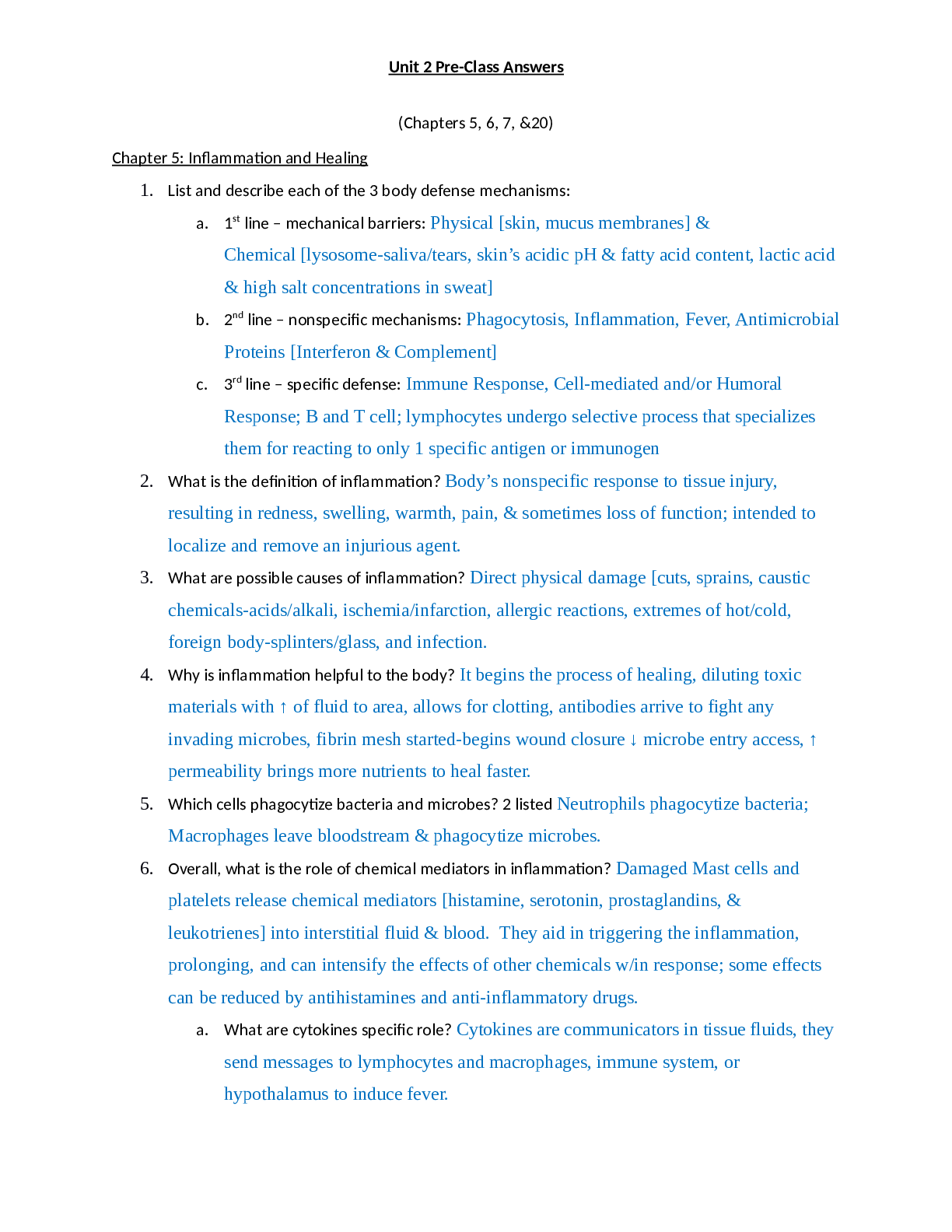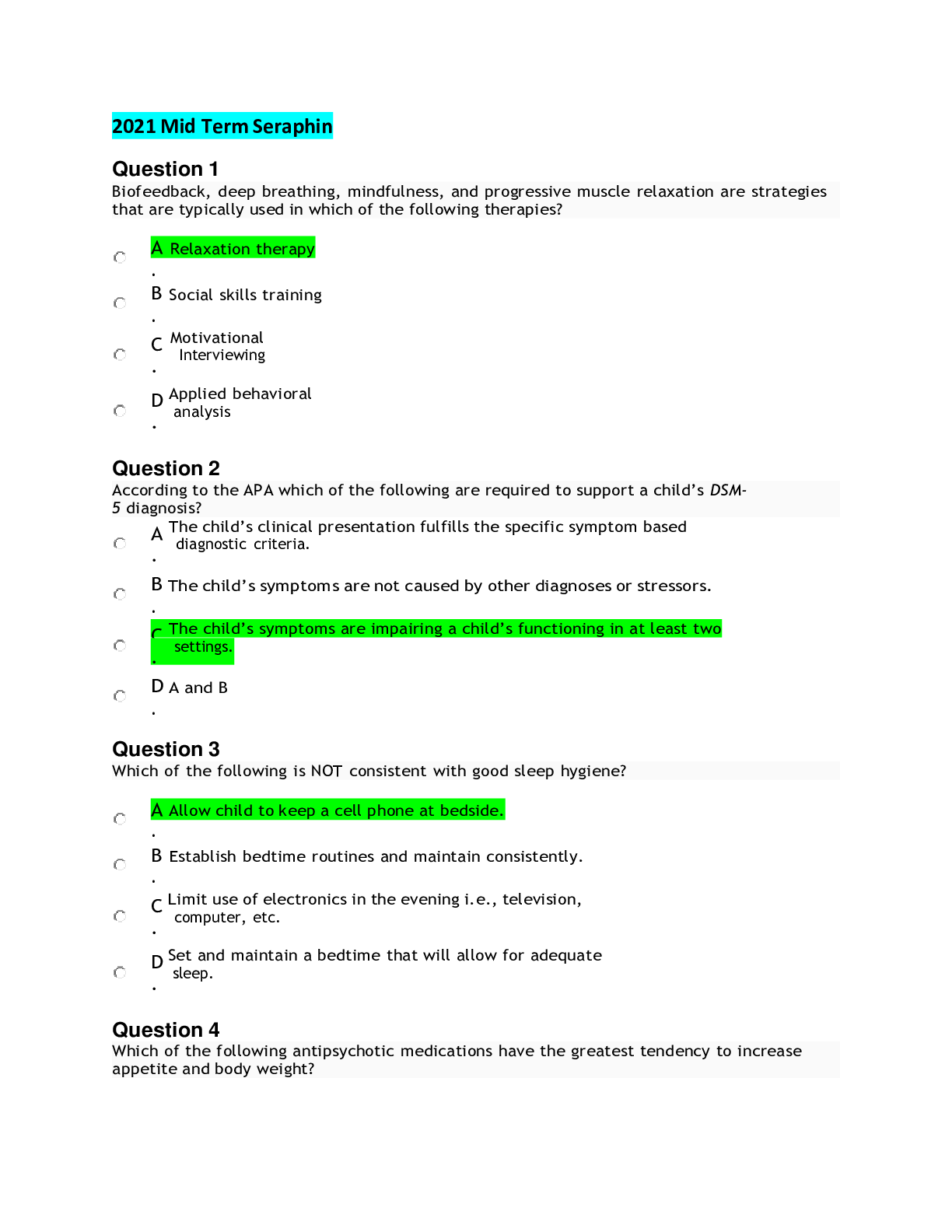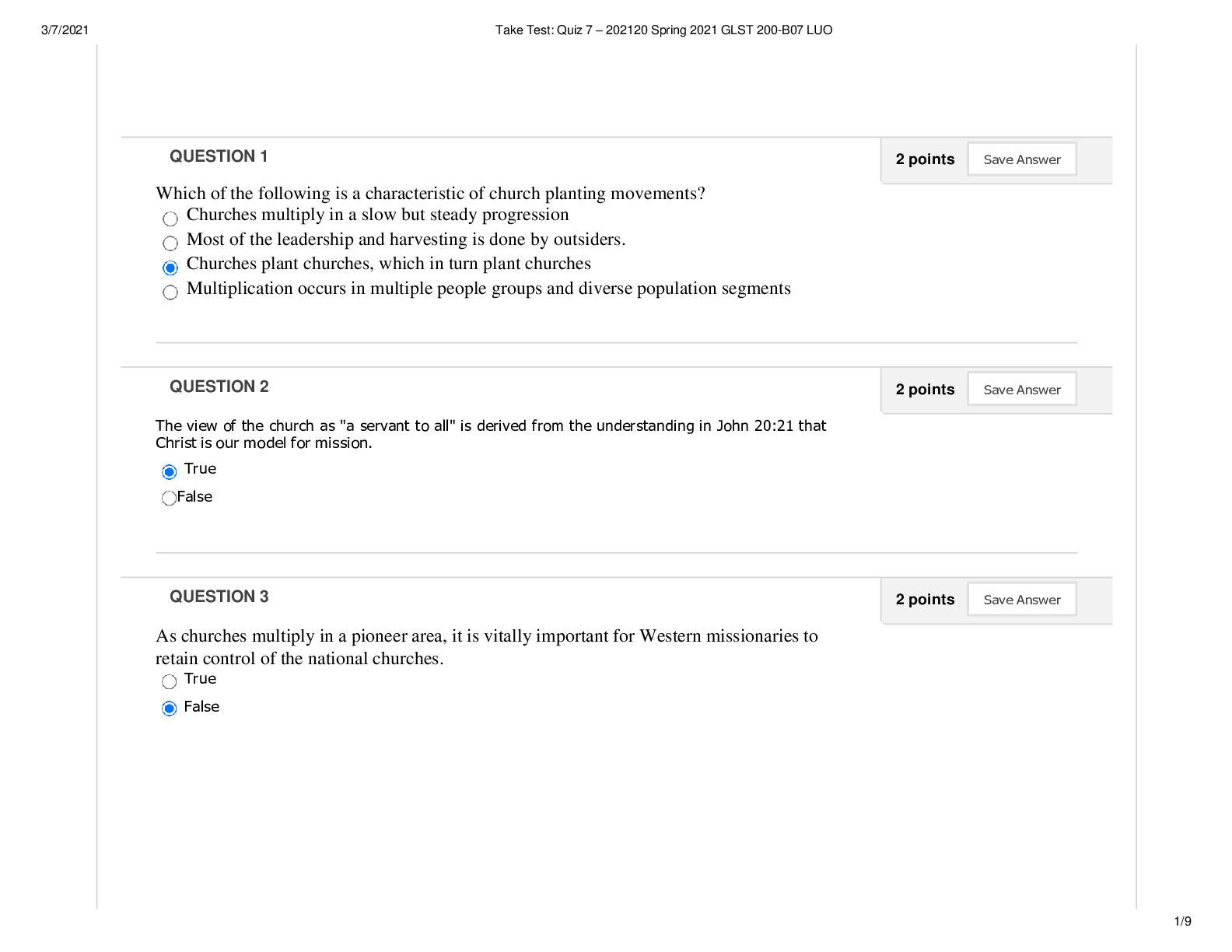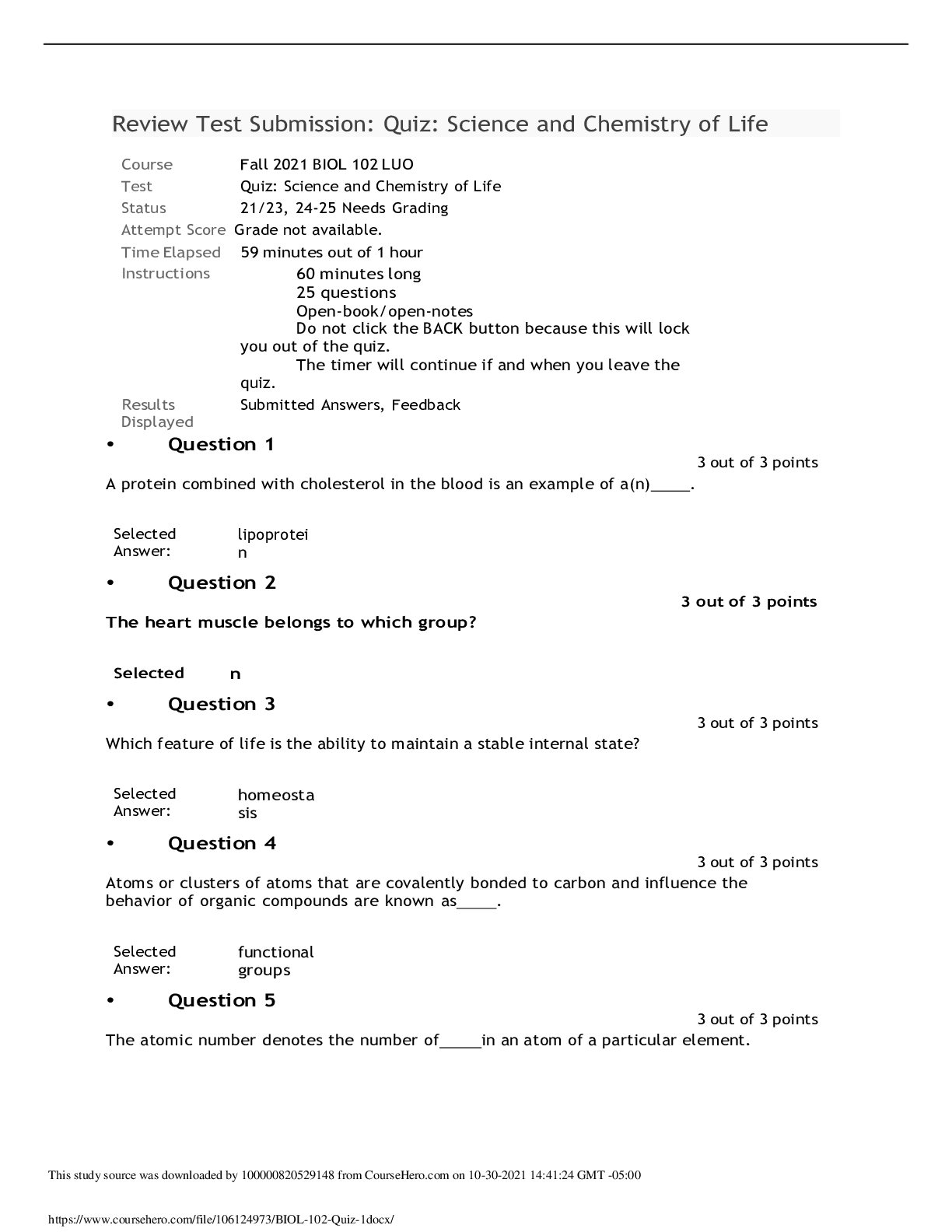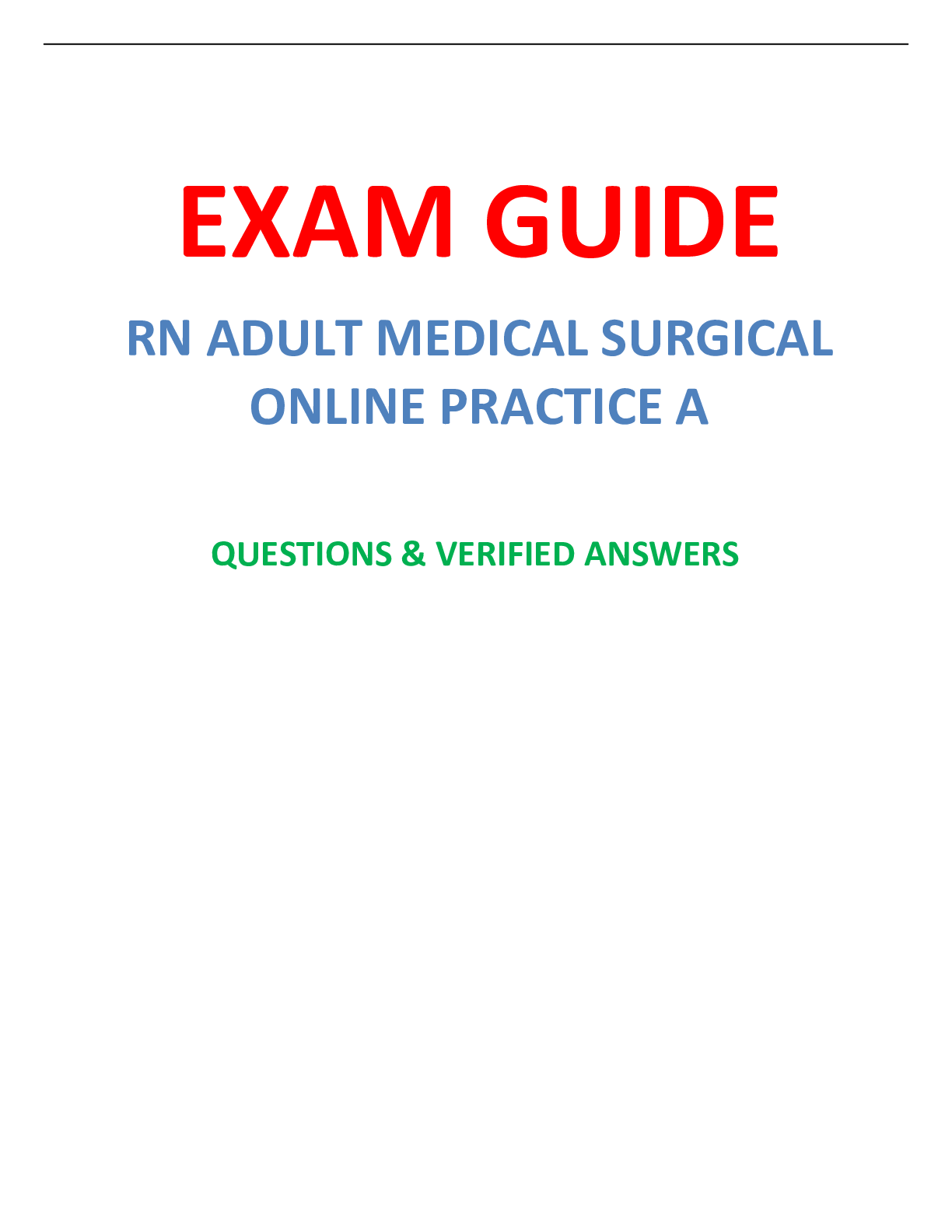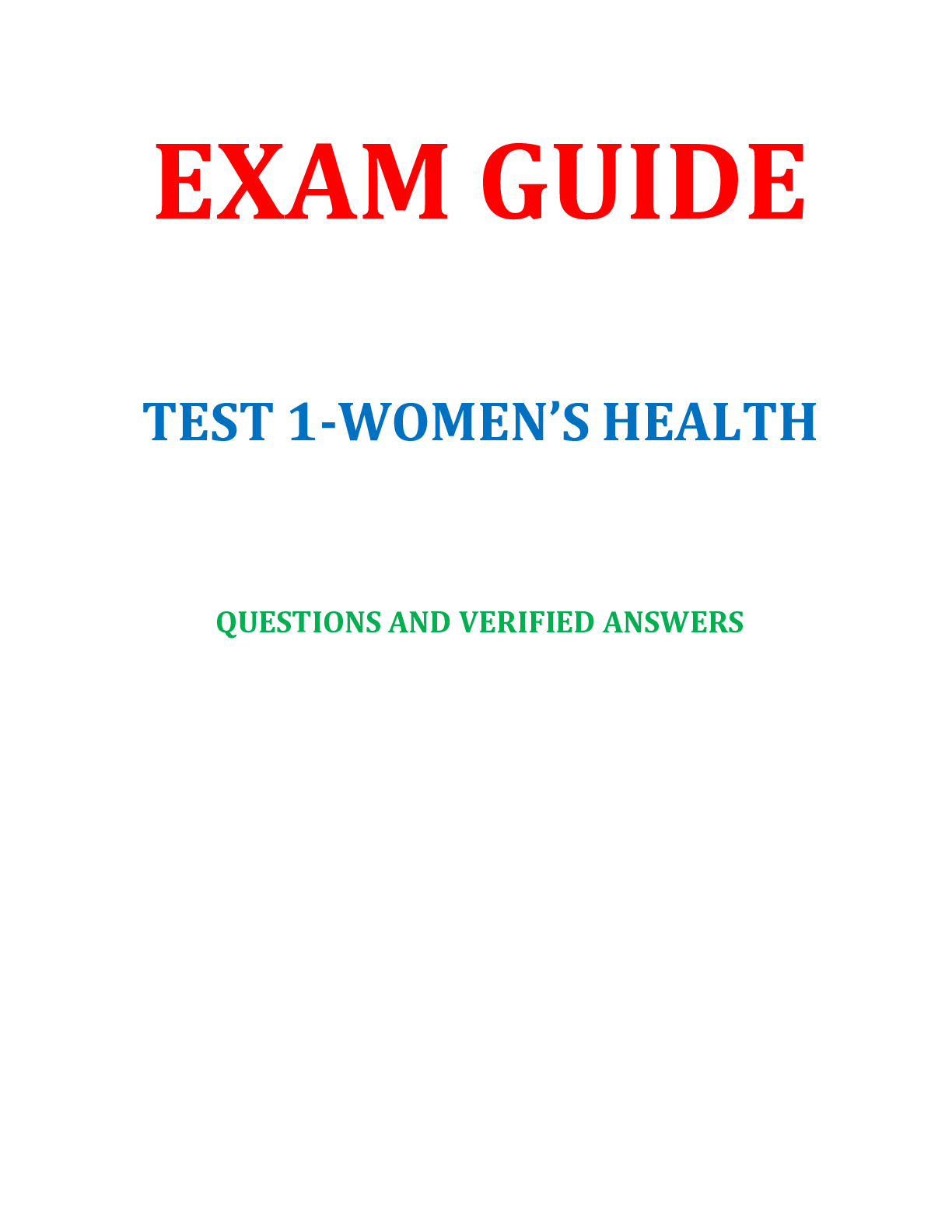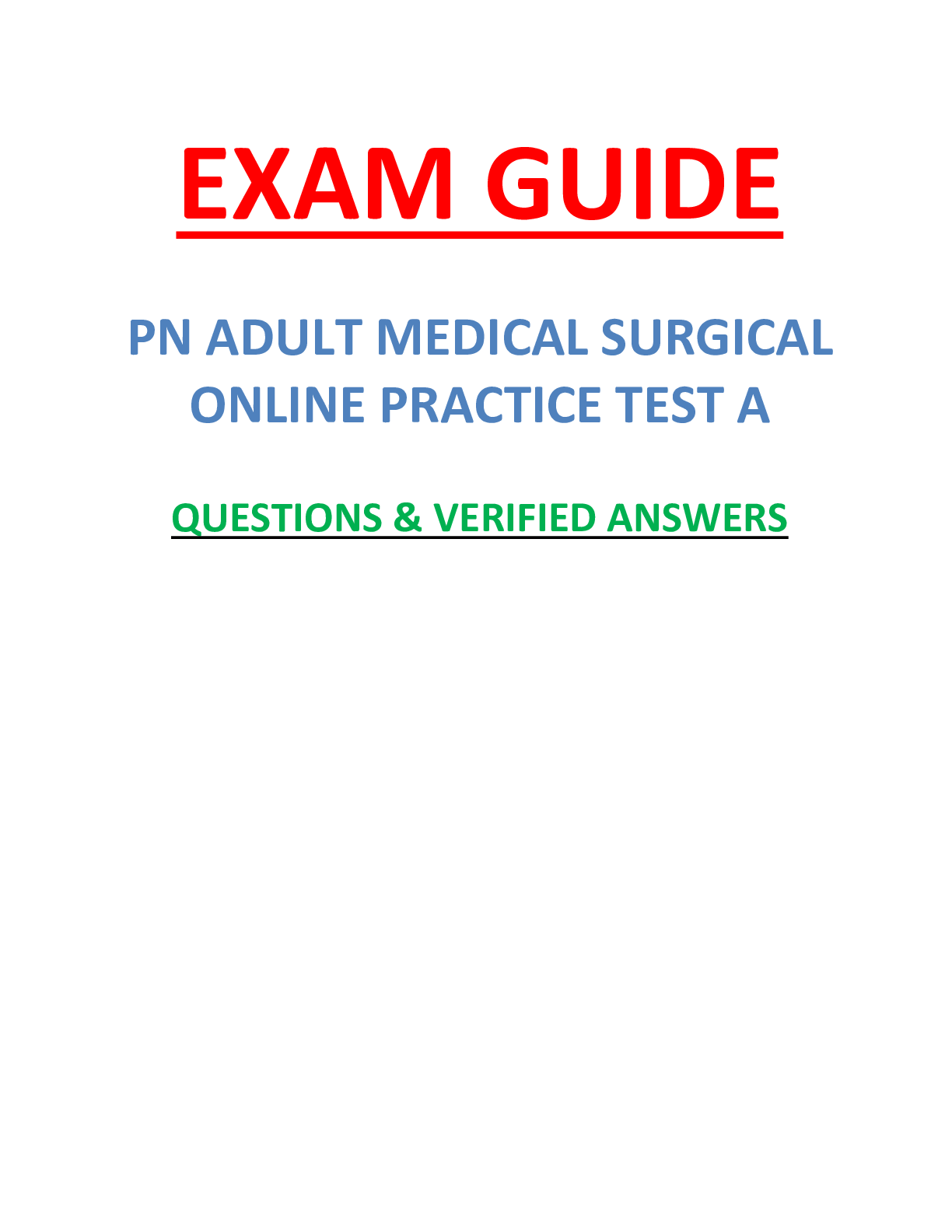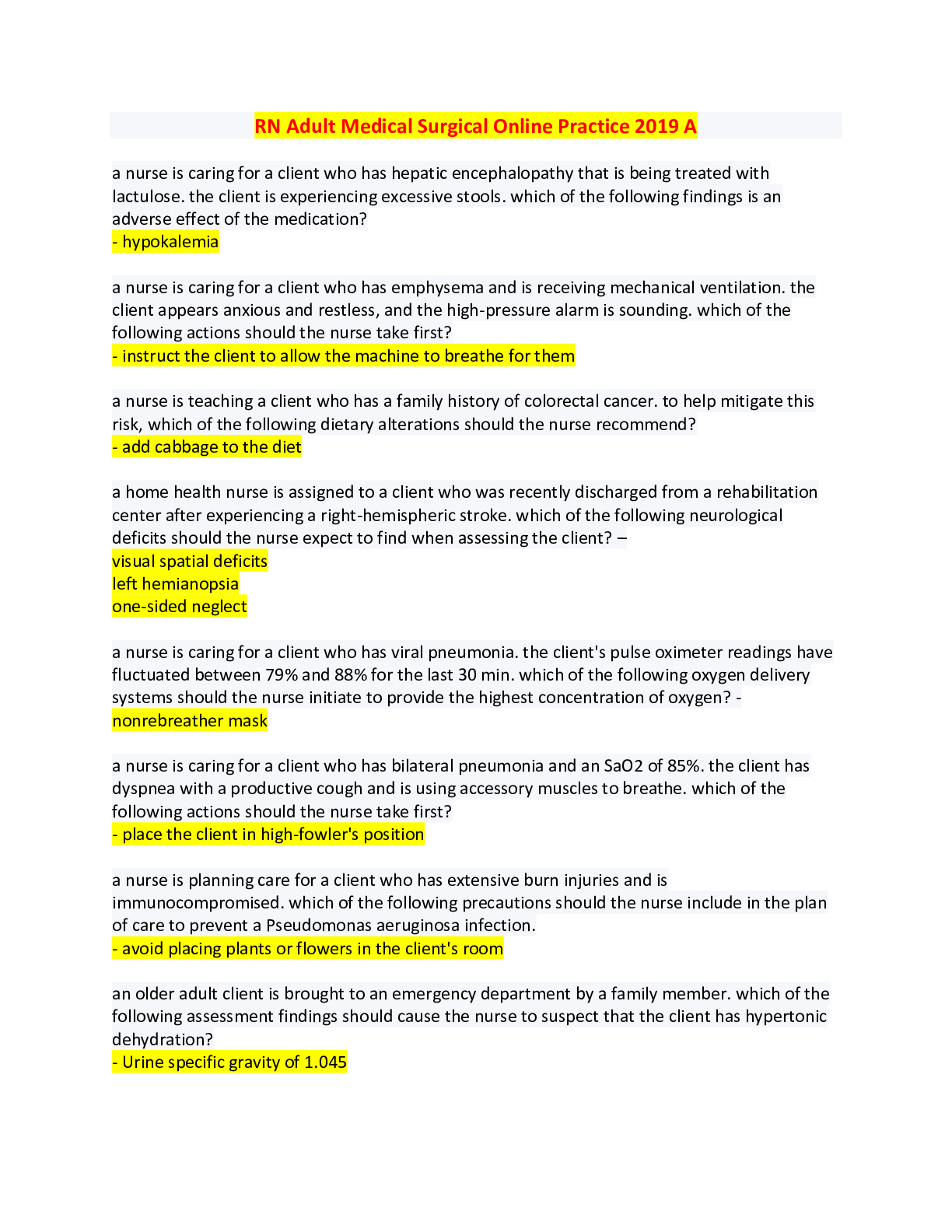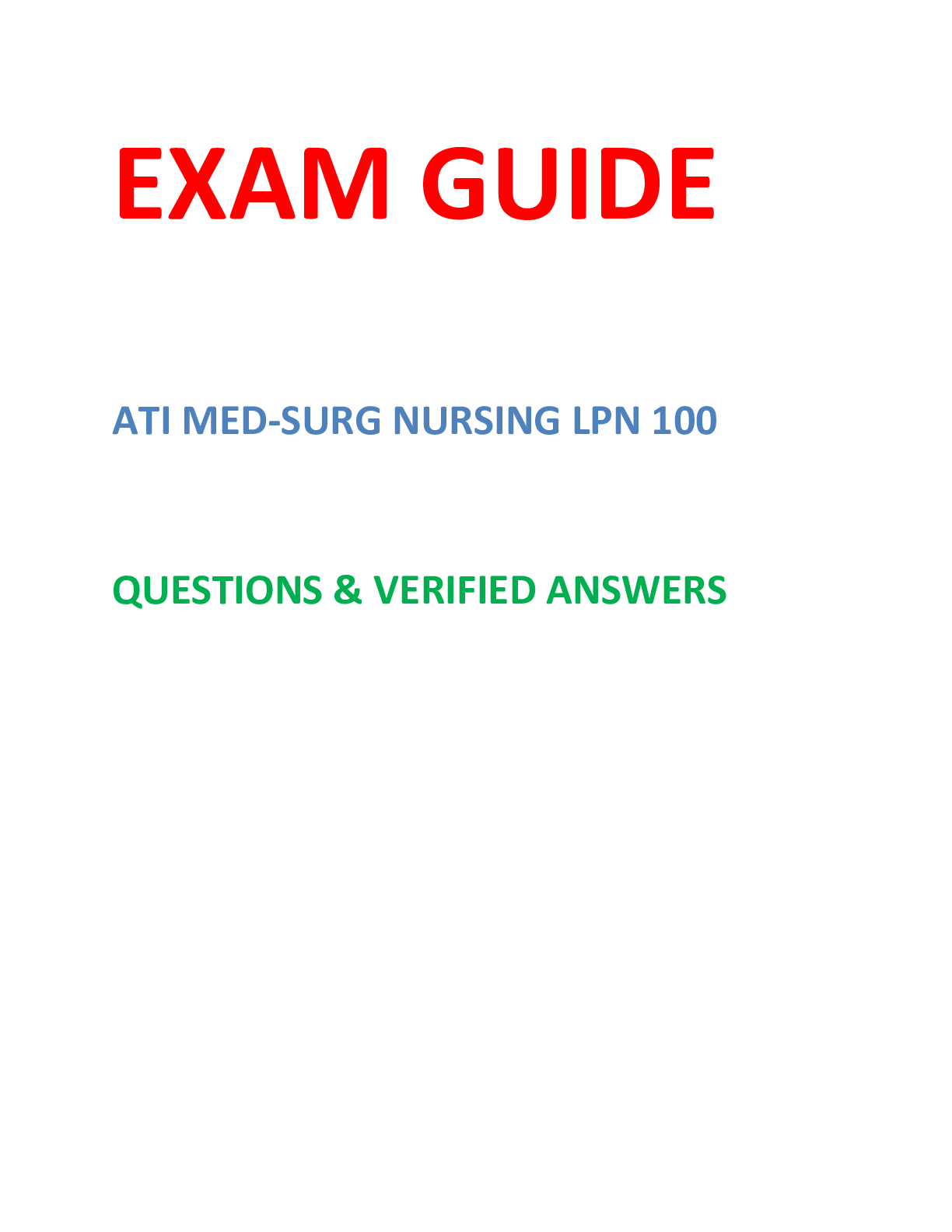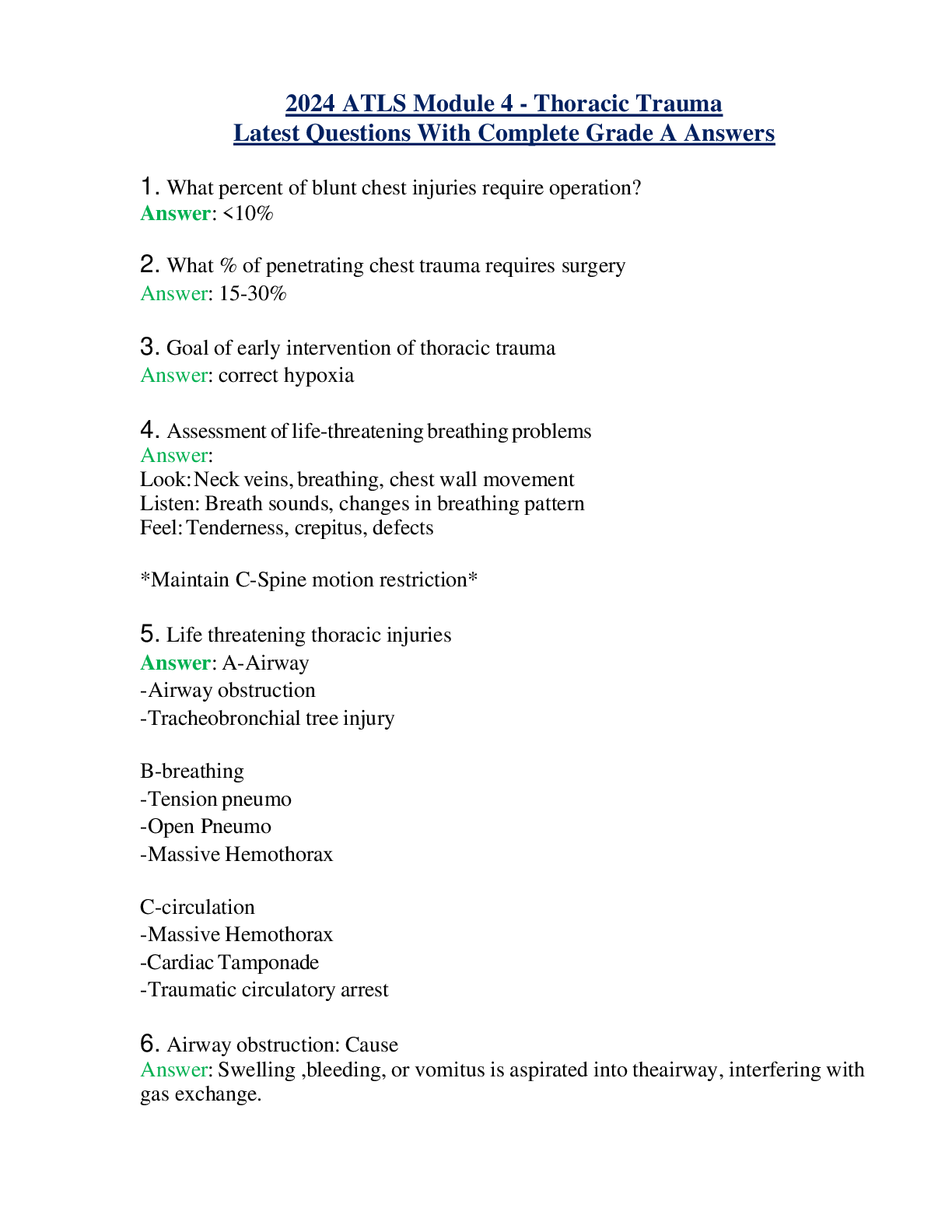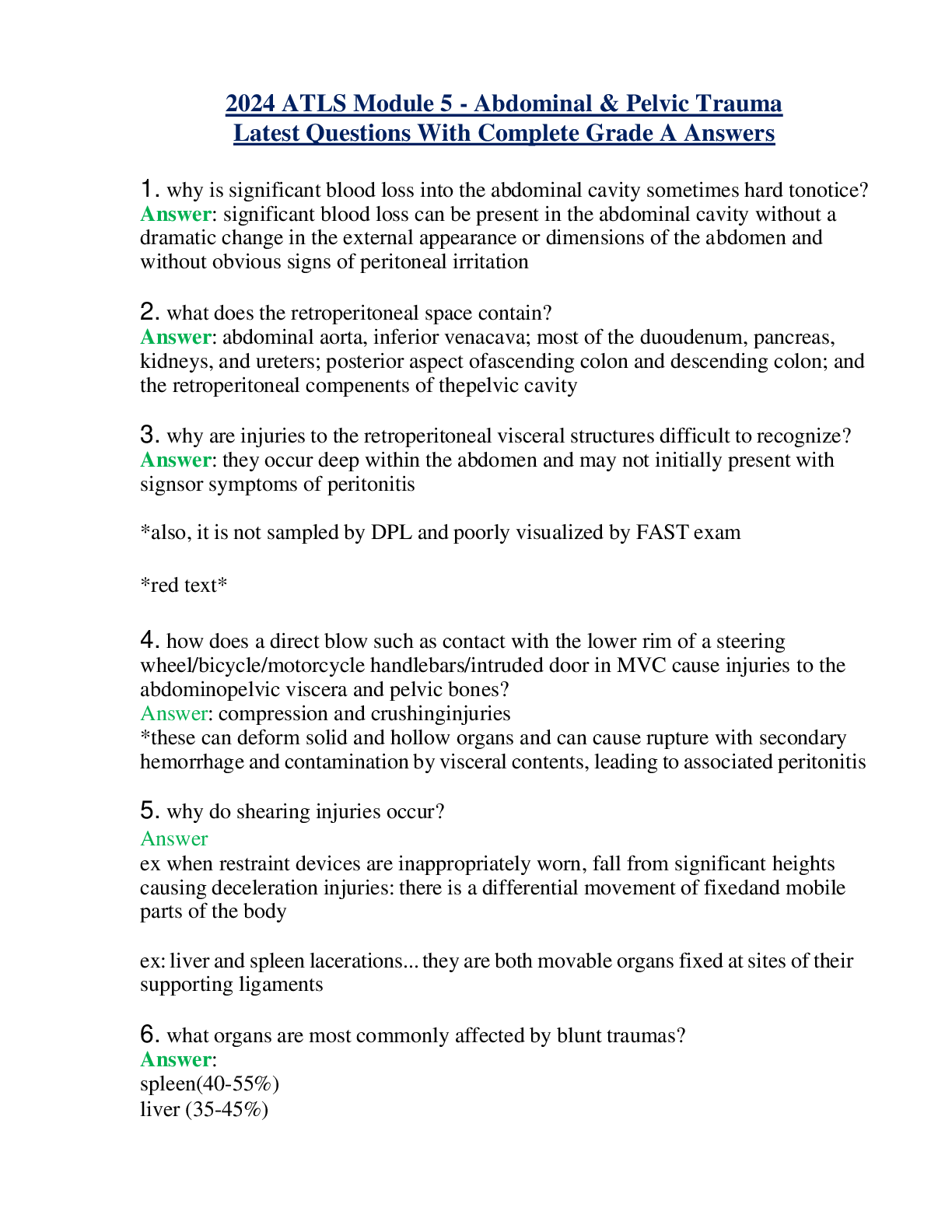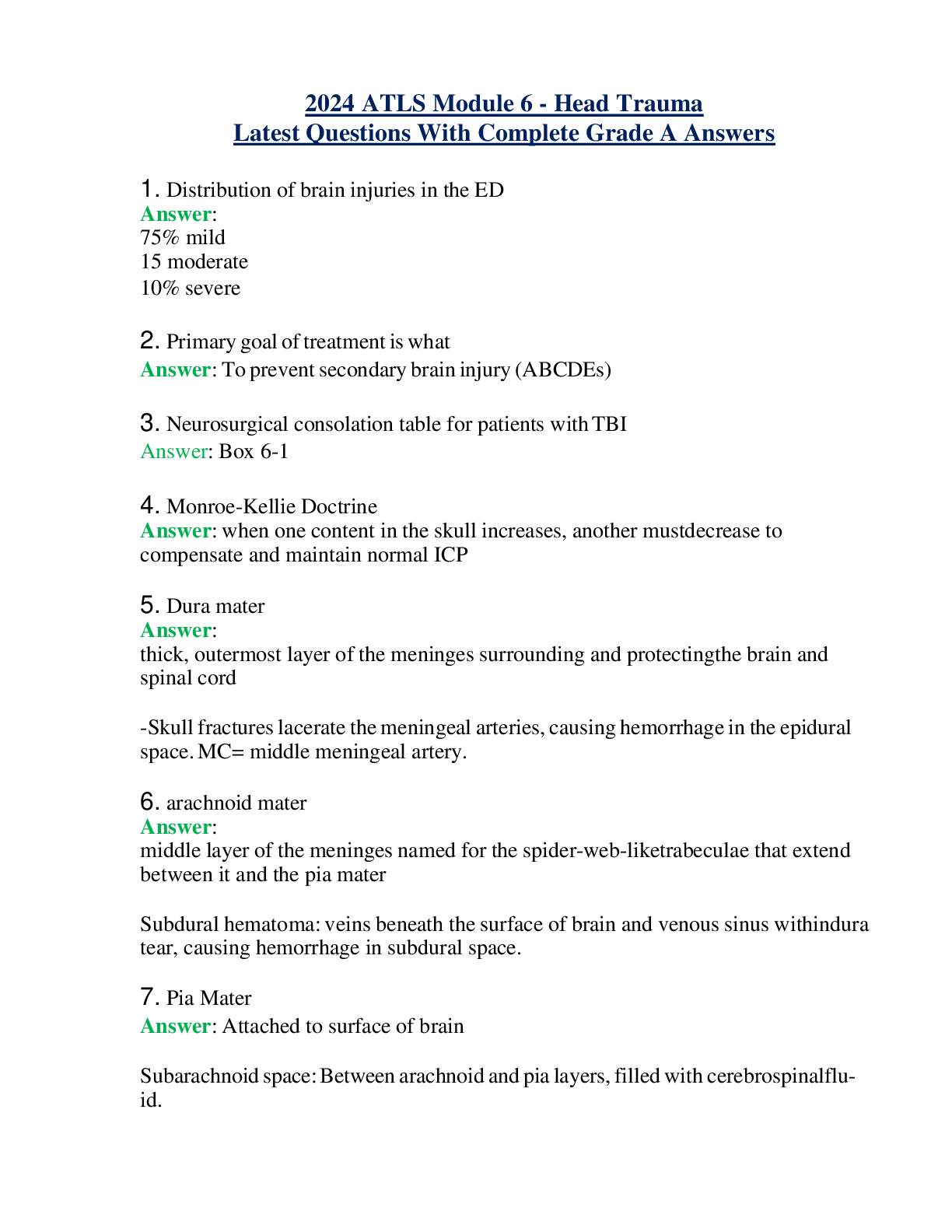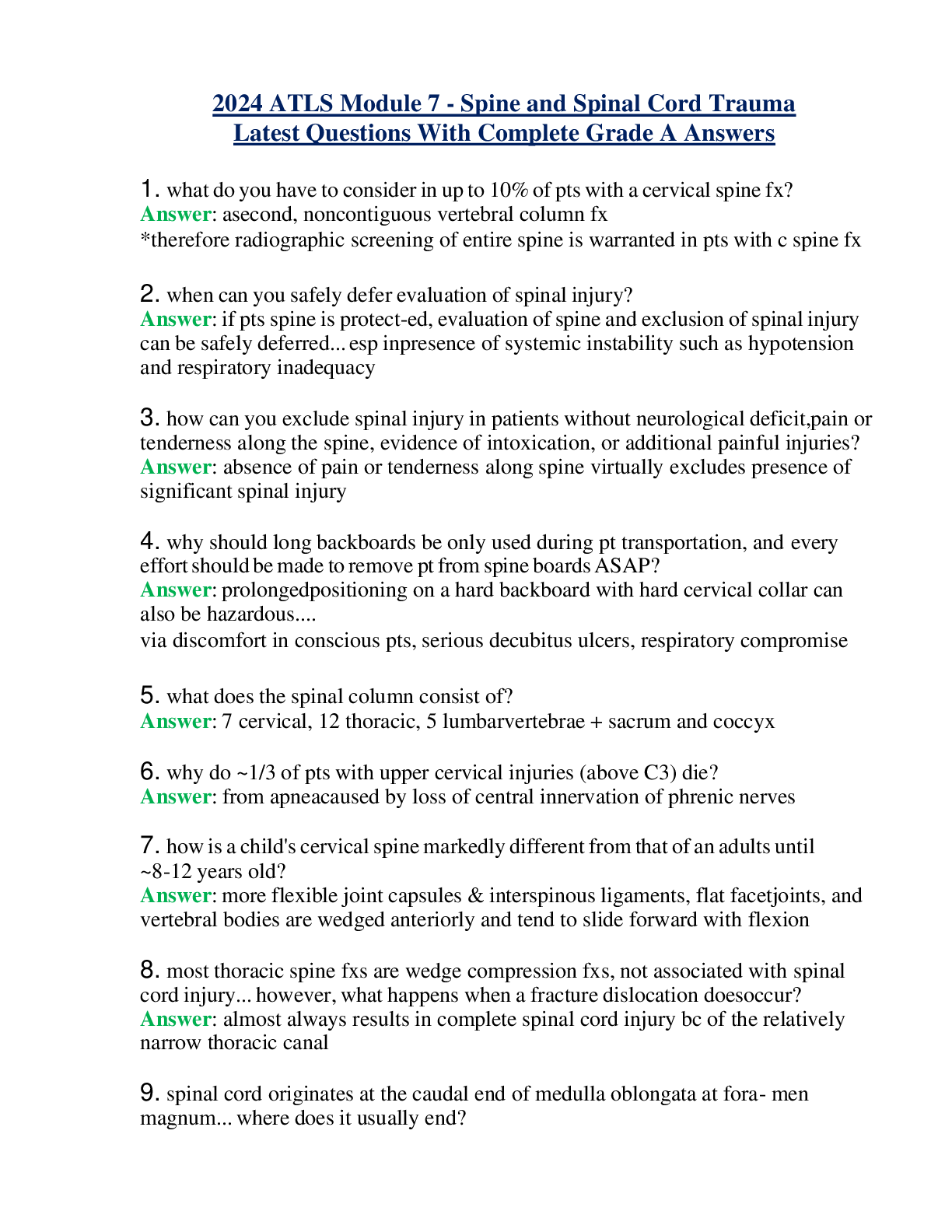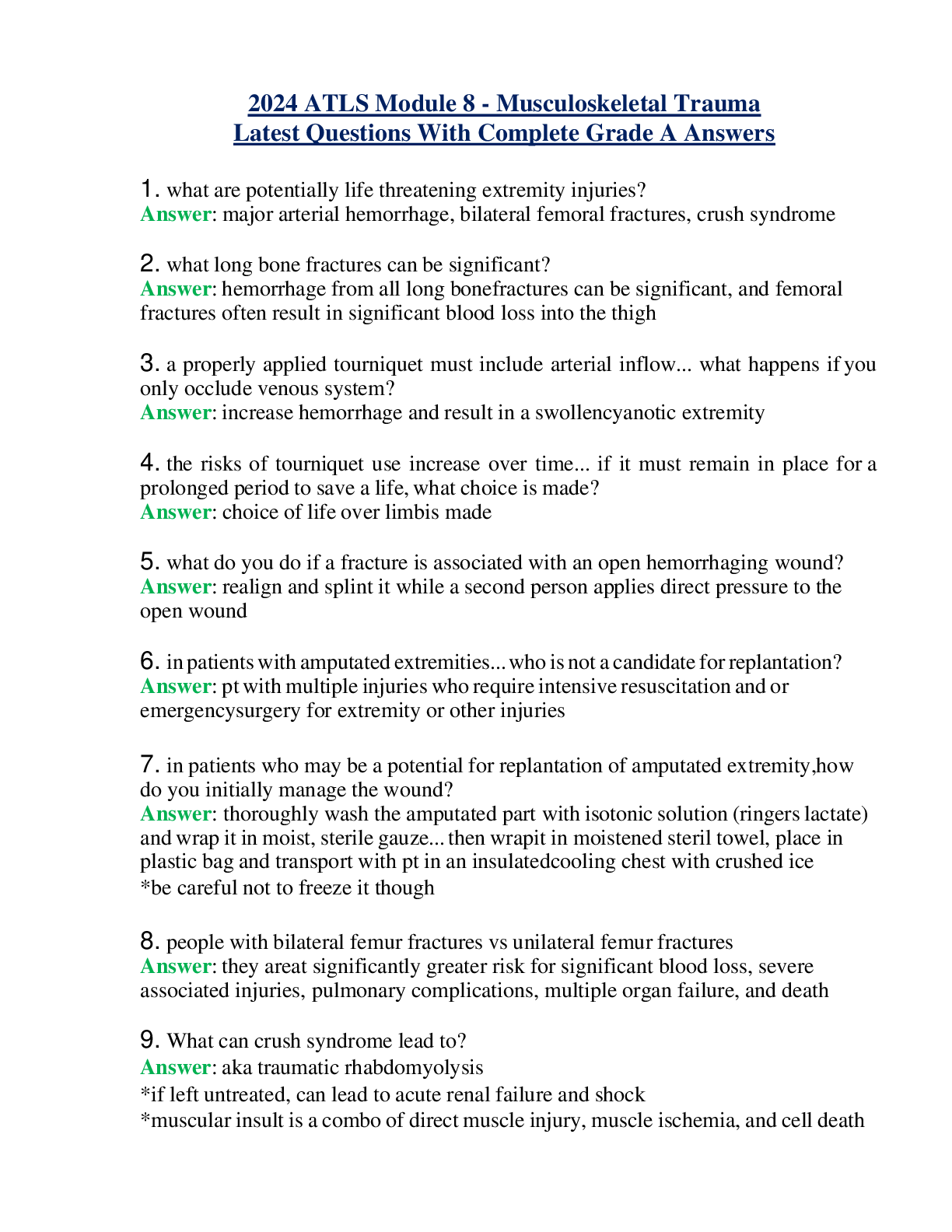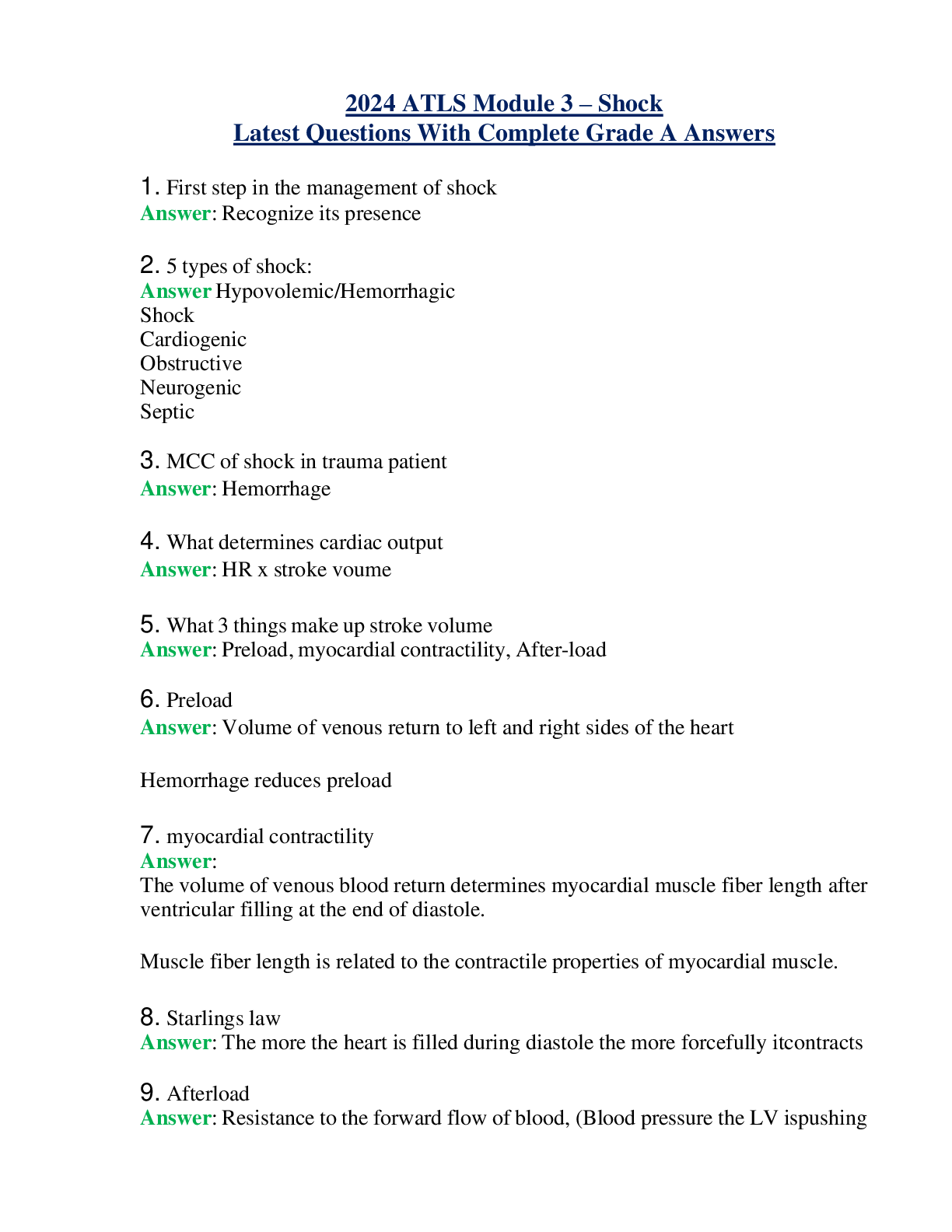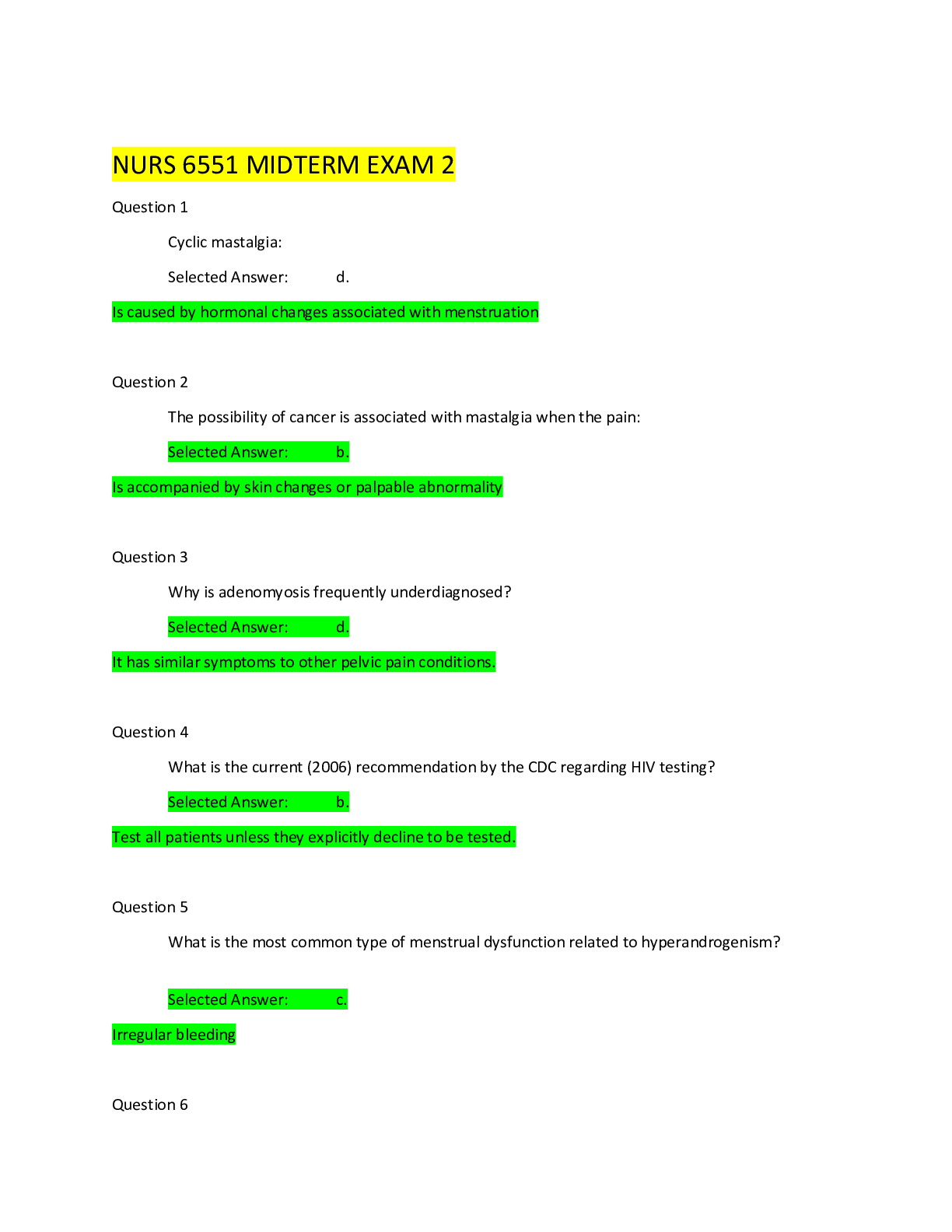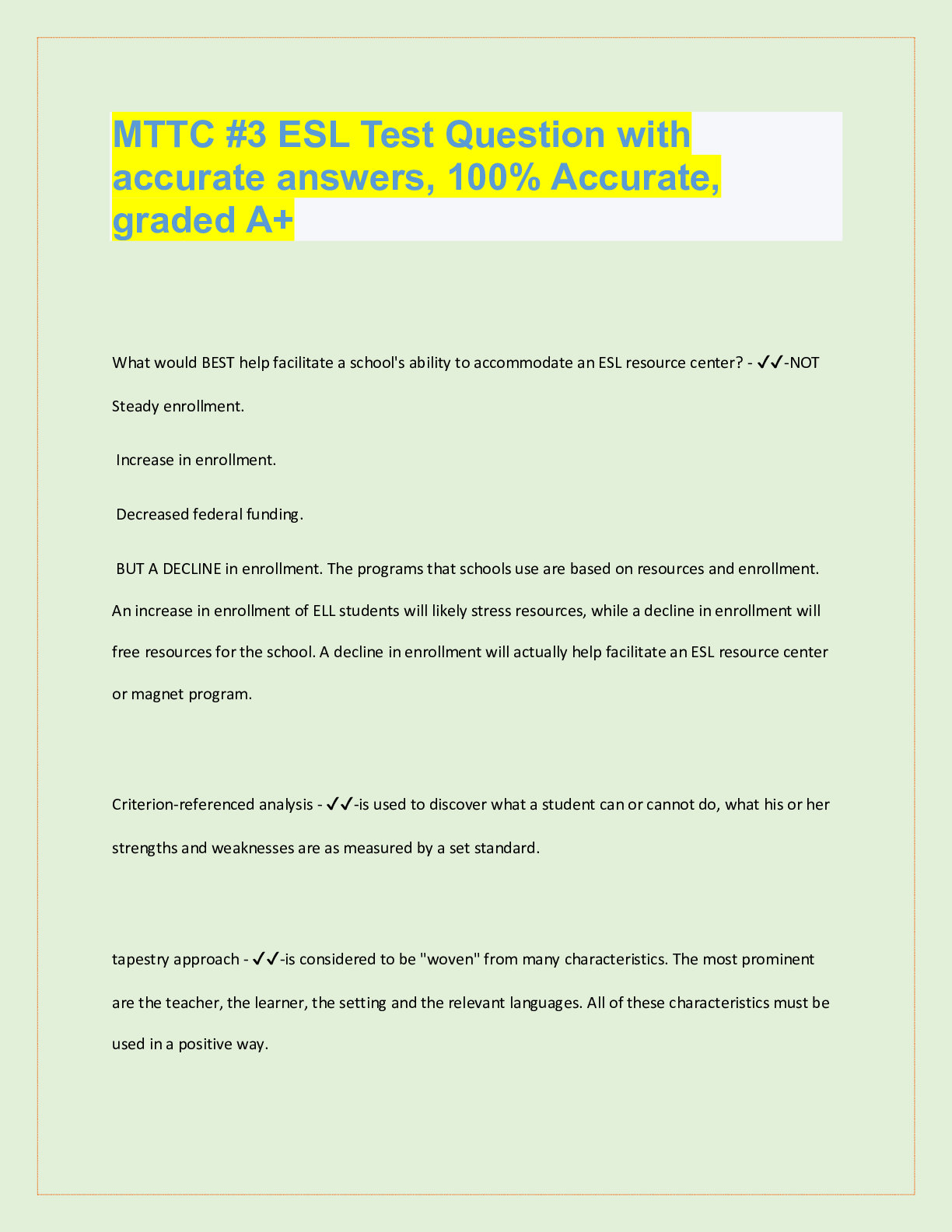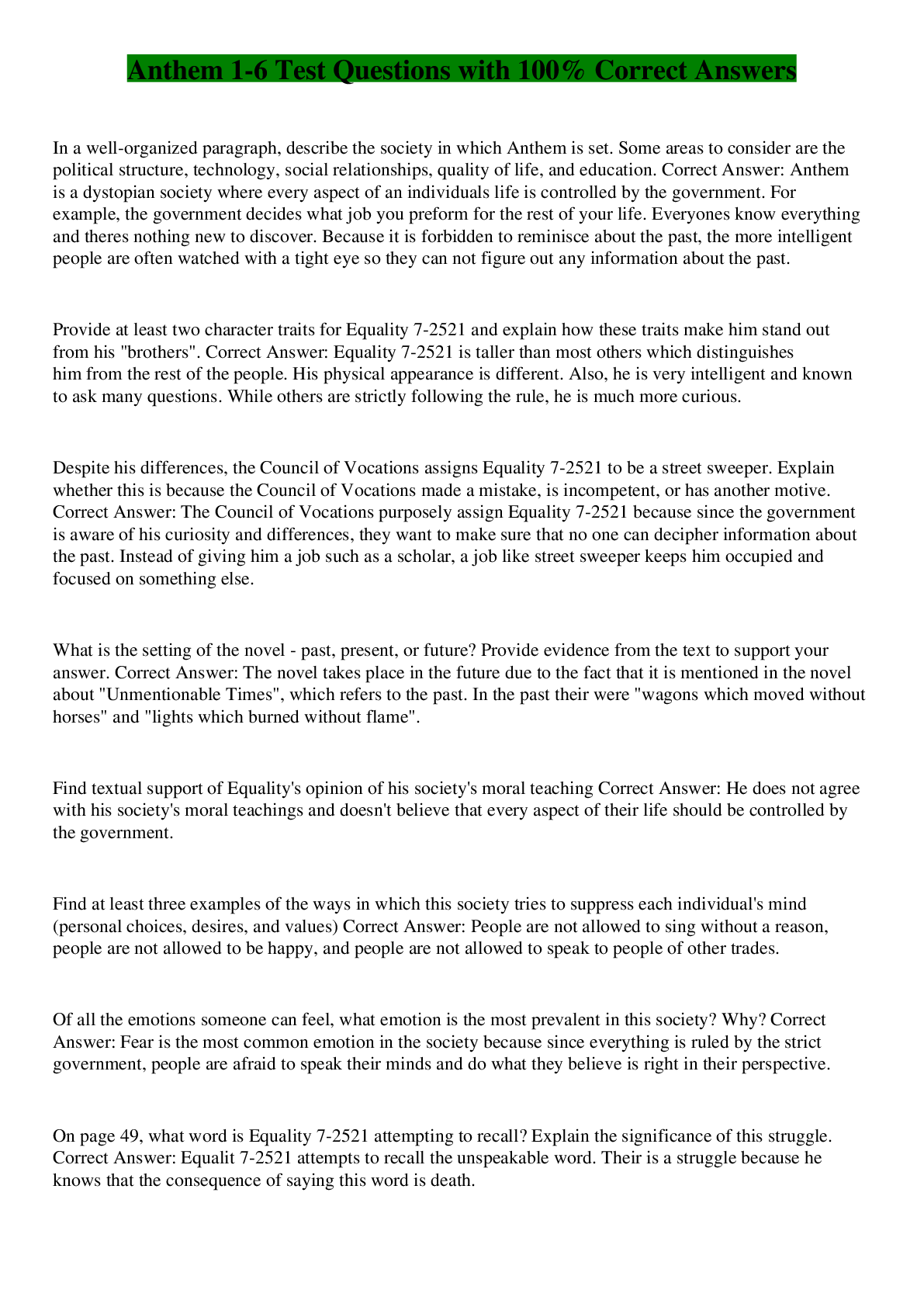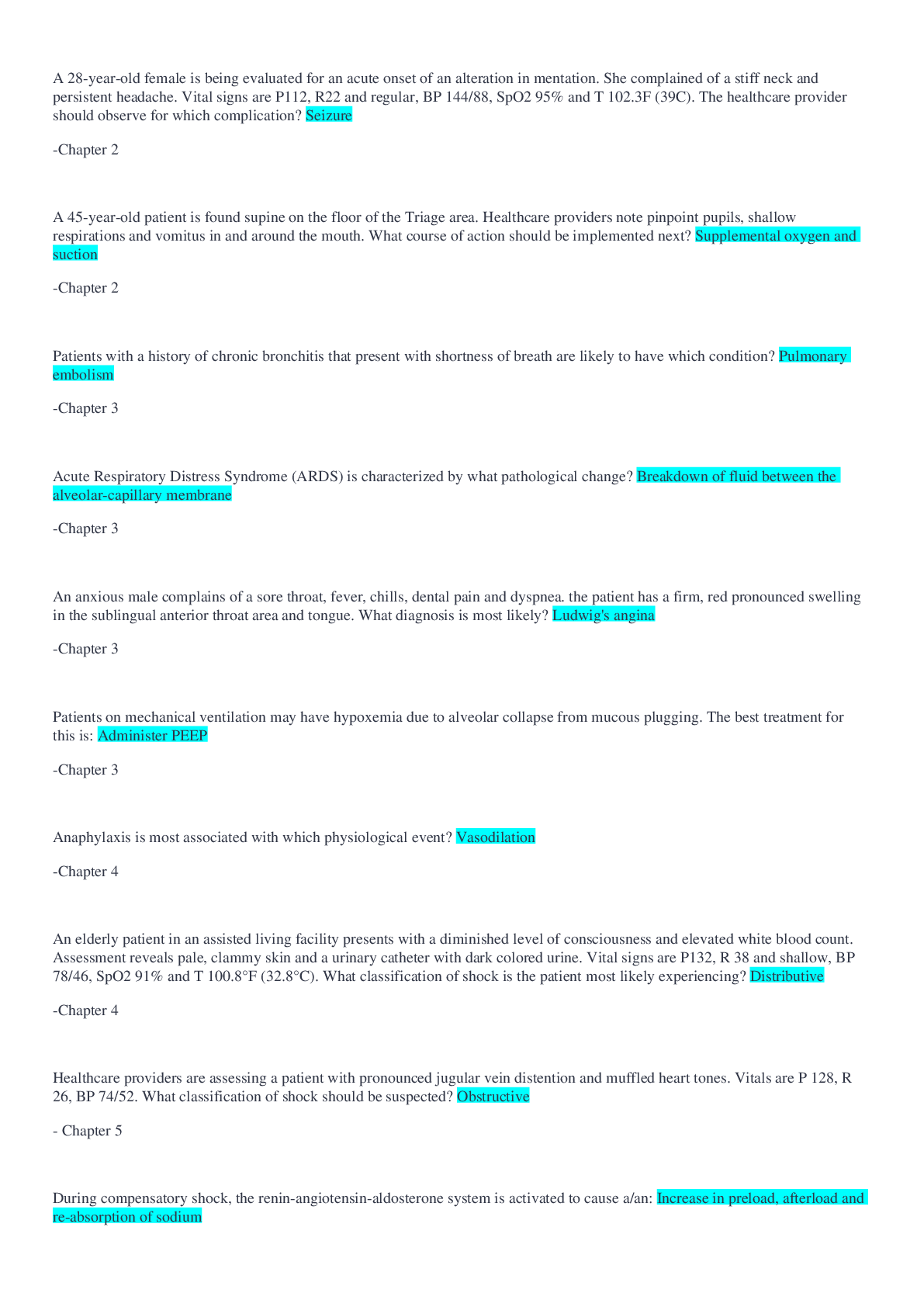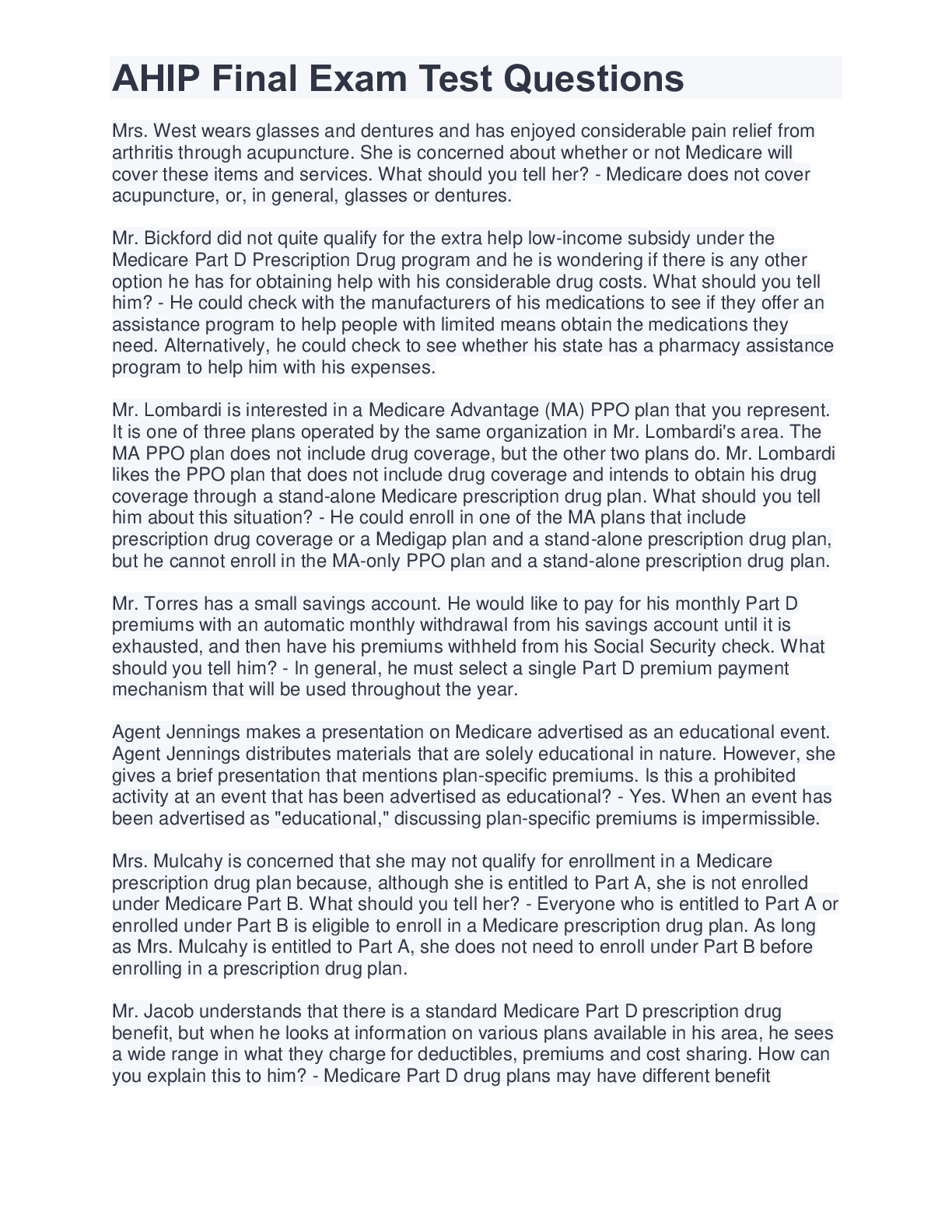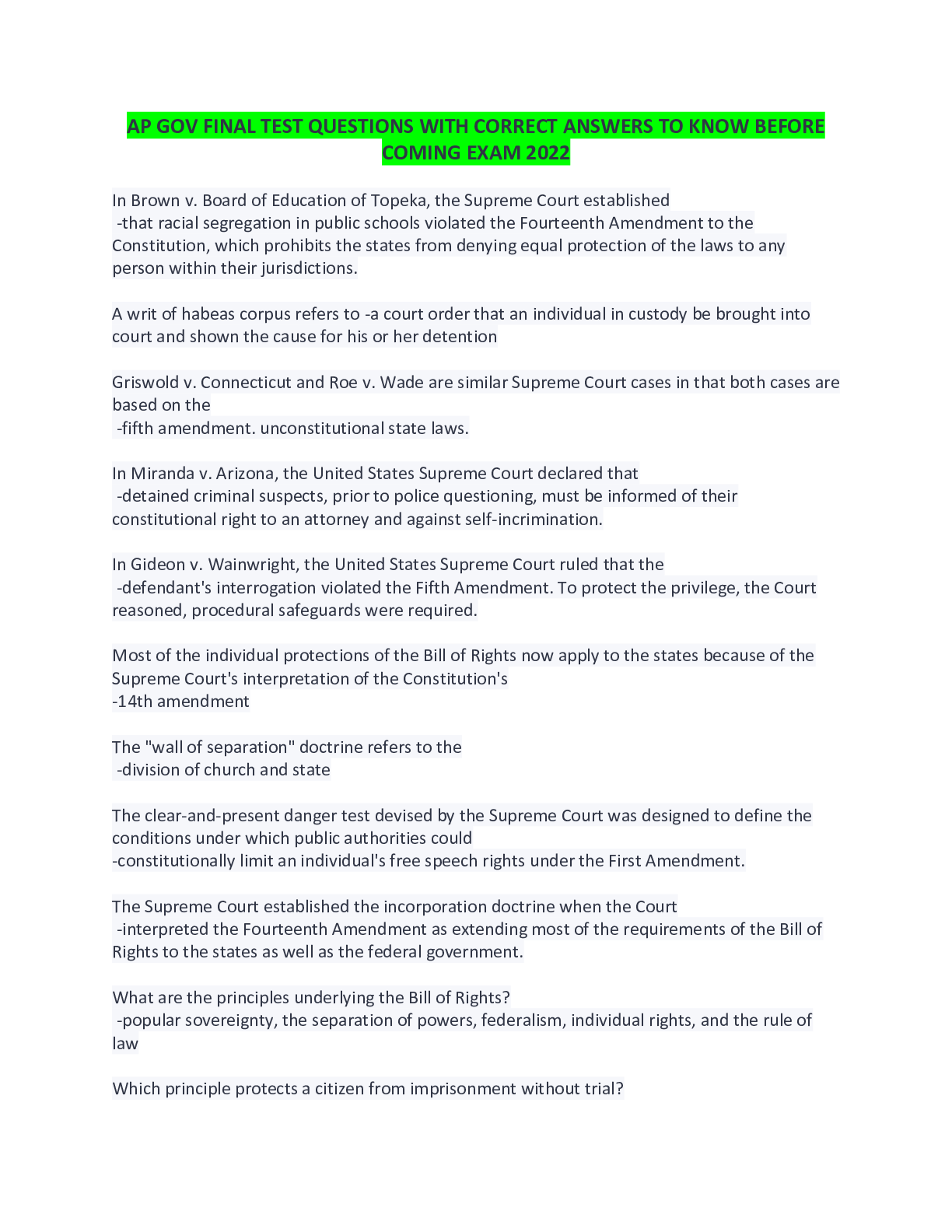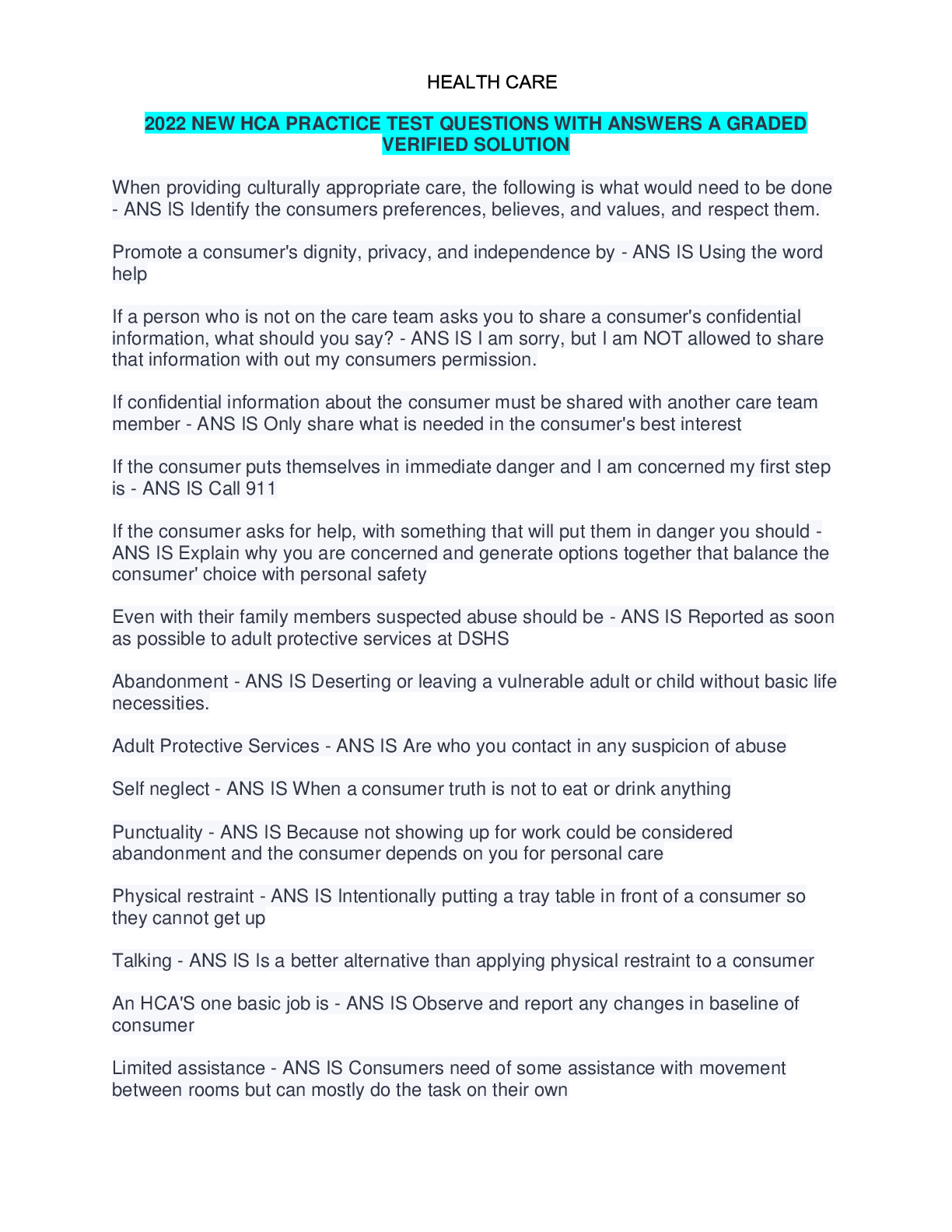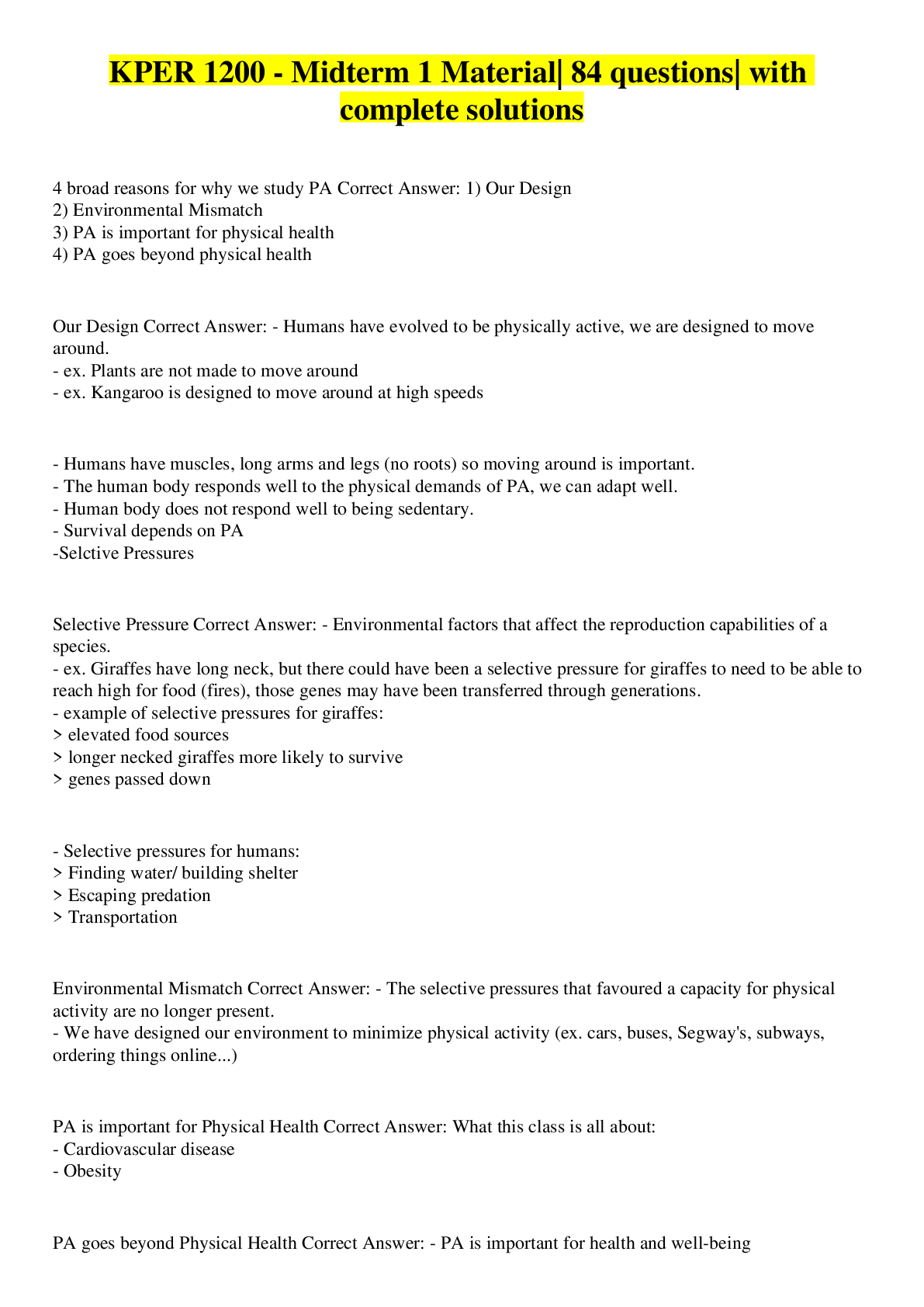NCLEX-RN Practice Test Questions with Rationales. Graded 100%
Document Content and Description Below
SHARES Both the client and the client’s spouse have knowledge deficits relating to advance directives. Legally married spouses do not automatically serve for the other spouse’s durable power o... f attorney for health care decisions; others than the spouse can be legally appointed while people are married. 2. The Patient Self Determination Act of the United States protects clients in terms of their rights to what? Select all that apply. A. Privacy and to have their medical information confidential unless the client formally approves the sharing of this information with others such as family members. B. Make healthcare decisions and to have these decisions protected and communicated to others when they are no longer competent to do so. C. Be fully informed about all treatments in term of their benefits, risks and alternatives to them so the client can make a knowledgeable and informed decision about whether or not to agree to having it D. Make decisions about who their health care provider is without any coercion or undue influence of others including healthcare providers. Correct Response: B, D The Patient Self Determination Act, which was passed by the US Congress in 1990, gives Americans the right to make healthcare decisions and to have these decisions protected and communicated to others when they are no longer competent to do so. These decisions can also include rejections for future care and treatment and these decisions are reflect in advance directives. This Act also supports the rights of the client to be free of any coercion or any undue influence of others including healthcare providers. The Health Insurance Portability and Accountability Act (HIPAA) supports and upholds the clients’ rights to confidentially and the privacy of their medical related information regardless of its form. It covers hard copy and electronic medical records unless the client has formally approved the sharing of this information with others such as family members. The elements of informed consent which includes information about possible treatments and procedures in terms of their benefits, risks and alternatives to them so the client can make a knowledgeable and informed decision about whether or not to agree to having it may be part of these advanced directives, but the law that protects these advance directives is the Patient Self Determination Act. SHARES 3. Your client is in the special care area of your hospital with multiple trauma and severe bodily burns. This 45 year old male client has an advance directive that states that the client wants all life saving measures including cardiopulmonary resuscitation and advance cardiac life support, including mechanical ventilation. As you are caring for the client, the client has a complete cardiac and respiratory arrest. This client has little of no chance for survival and they are facing imminent death according to your professional judgement, knowledge of pathophysiology and your critical thinking. You believe that all life saving measures for this client would be futile. What is the first thing that you, as the nurse, should do? A. Call the doctor and advise them that the client’s physical status has significantly changed and that they have just had a cardiopulmonary arrest. B. Begin cardiopulmonary resuscitation other emergency life saving measures. C. Notify the family of the client’s condition and ask them what they should be done for the client. D. Insure that the client is without any distressing signs and symptoms at the end of life. Correct Response: B You must immediately begin cardiopulmonary resuscitation and all life saving measures as requested.by the client in their advance directive despite the nurse’s own beliefs and professional opinions. Nurses must uphold the client’s right to accept, choose and reject any and all of treatments, as stated in the client’s advance directive. You would not call the doctor first; your priority is the sustaining of the client’s life; you would also not immediately notify the family for the same reason and, when you do communicate with the family at a later time, you would not ask them what should or should not be done for the client when they wishes are already contained in the client’s advance directive. Finally, you would also insure that the client is without pain and all other distressing signs and symptoms at the end of life, but the priority and the first thing that you would do is immediately begin cardiopulmonary resuscitation and all life saving measures as requested by the client in their advance directive, according to the ABCs and Maslow’s Hierarchy of Needs. 4. You are caring for a high risk pregnant client who is in a life threatening situation. The fetus is also at high risk for death. Clinical decisions are being made that concern you because some of these treatments and life saving measures promote the pregnant woman’s life at the same time that they significantly jeopardize the fetus’ life and viability and other decisions can preserve the fetus’s life at theSeHxApR eE Snse of the pregnant woman’s life. Which role of the nurse is the priority at this time? A. Case manager B. Collaborator C. Coordinator of care D. Advocacy Correct Response: D The priority role of the nurse is advocacy. The nurse must serve as the advocate for both the fetus and the mother at risk as the result of this ethical dilemma where neither option is desirable. As an advocate, the nurse would seek out resources and people, such as the facility’s ethicist or the ethics committee, to resolve this ethical dilemma. 5. A nurse who organizes and establishes a political action committee (PAC) in their local community to address issues relating to the accessibility and a¦ordability of healthcare resources in the community is serving in which capacity and role of the registered nurse? A. Client advocate B. Collaborator C. Politician D. Entrepreneur Correct Response: A A nurse who organizes and establishes a political action committee (PAC) in their local community to address issues relating to the accessibility and affordability of healthcare resources in the community is serving as the client advocate. As you should know, the definition of “client” includes not only individual clients, and families as a unit, but also populations such as the members of the local community. Although the nurse, as the organizer of this political action committee (PAC), will have to collaborate with members of the community to promote the accessibility and affordability of healthcare resources in the community, this is a secondary role rather than the primary role. Additionally, although the nurse is serving in a political advocacy effort, the nurse is not necessarily a politician and there is no evidence that this nurse is an entrepreneur. 6. Which of the following are the five Rights of Supervision? SHARES A. The right task, the right circumstances, the right person, the right competency, and the right supervision or feedback B. The right task, the right circumstances, the right person, the right direction or communication, and the right supervision or feedback C. The right competency, the right education and training, the right scope of practice, the right environment and the right client condition D. The right competency, the right person, the right scope of practice, the right environment and the right client condition Correct Response: B The Five Rights of Delegation include the right task, the right circumstances, the right person, the right direction or communication, and the right supervision or feedback. The right competency is not one of these basic Five Rights, but instead, competency is considered and validated as part of the combination of matching the right task and the right person; the right education and training are functions of the right task and the right person who is able to competently perform the task; the right scope of practice, the right environment and the right client condition are functions of the legal match of the person and the task; and the setting of care which is not a Right of Delegation and the matching of the right person, task and circumstances. 7. The registered nurse, prior to the delegation of tasks to other members of the nursing care team, evaluates the ability of sta¦ members to perform assigned tasks for the position as based on which legal consideration? A. The American Nurses Association’s Scopes of Practice B. The American Nurses Association’s Standards of Care C. State statutes D. Federal law Correct Response: C The registered nurse, prior to the delegation of tasks to other members of the nursing care team, evaluates the ability of staff members to perform assigned tasks for the position as based on state statutes that differentiate among the different types of nurses and unlicensed assistive personnel that are legally able to perform different tasks. SHARES Although the American Nurses Association’s Standards of Care guide nursing practice, these standards are professional rather than legal standards and the American Nurses Association does not have American Nurses Association’s Scopes of Practice, only the states’ laws or statutes do. Lastly, scopes of practice are within the legal domain of the states and not the federal government. 8. The best way to objectively evaluate the e¦ectiveness of an individual sta¦ member’s time management skills in a longitudinal manner is to: A. Observe the staff member during an entire shift of duty to determine whether or not the nurse has accurately and appropriately established priorities. B. Observe the staff member during an entire shift of duty to determine whether or not the nurse has accurately and appropriately completed priority tasks. C. Ask the staff member how they feel like they have been able to employ their time management skills for the last six months. D. Collect outcome data over time and then aggregate and analyze this data to determine whether or not the staff member has completed reasonable assignments in the allotted time before the end of their shift of duty. Correct Response: D The best way to objectively evaluate the effectiveness of an individual staff member’s time management skills in a longitudinal manner is to collect outcome data over time, and then aggregate and analyze this data to determine whether or not the staff member has completed reasonable assignments in the allotted time before the end of their shift of duty. Another way to perform this longitudinal evaluation is to look at the staff member’s use of over time, like the last six months, when the unit was adequately staffed. Observing the staff member during an entire shift of duty to determine whether or not the nurse has accurately and appropriately established priorities is a way to evaluate the short term abilities for establishing priorities and not assignment completion and observing the staff member during an entire shift of duty to determine whether or not the nurse has accurately and appropriately completed priority tasks is a way to evaluate the short term abilities for completing established priorities and not a complete assignment which also includes tasks that are not of the highest priority. Lastly, asking the staff member how they feel like they have been able to employ their time management skills for the last six months is the use of subjective rather than objective evaluation. SHARES 9. Which of the following patient care tasks is coupled with the appropriate member of the nursing care team in terms of their legal scope of practice? A. An unlicensed staff member who has been “certified” by the employing agency to monitor telemetry: Monitoring cardiac telemetry B. An unlicensed assistive staff member like a nursing assistant who has been “certified” by the employing agency to insert a urinary catheter: Inserting a urinary catheter C. A licensed practical nurse: The circulating nurse in the perioperative area D. A licensed practical nurse: The first assistant in the perioperative area Correct Response: A An unlicensed staff member who has been “certified” by the employing agency to monitor telemetry can monitor cardiac telemetry; they cannot, however, interpret these cardiac rhythms and initiate interventions when interventions are indicated. Only the nurse can perform these roles. Unlicensed assistive staff member like a nursing assistant cannot under any circumstances be certified” by the employing agency to insert a urinary catheter or insert a urinary catheter because this is a sterile procedure and, legally, no sterile procedures can be done by an unlicensed assistive staff member like a nursing assistant. Lastly, the role of the circulating nurse is within the exclusive scope of practice for the registered nurse and the role of the first assistant is assumed only by a registered nurse with the advanced training and education necessary to perform competently in this capacity. Neither of these roles can be delegated to a licensed practical nurse or an unlicensed assistive staff member like a nursing assistant or a surgical technician. [Show More]
Last updated: 1 year ago
Preview 1 out of 123 pages
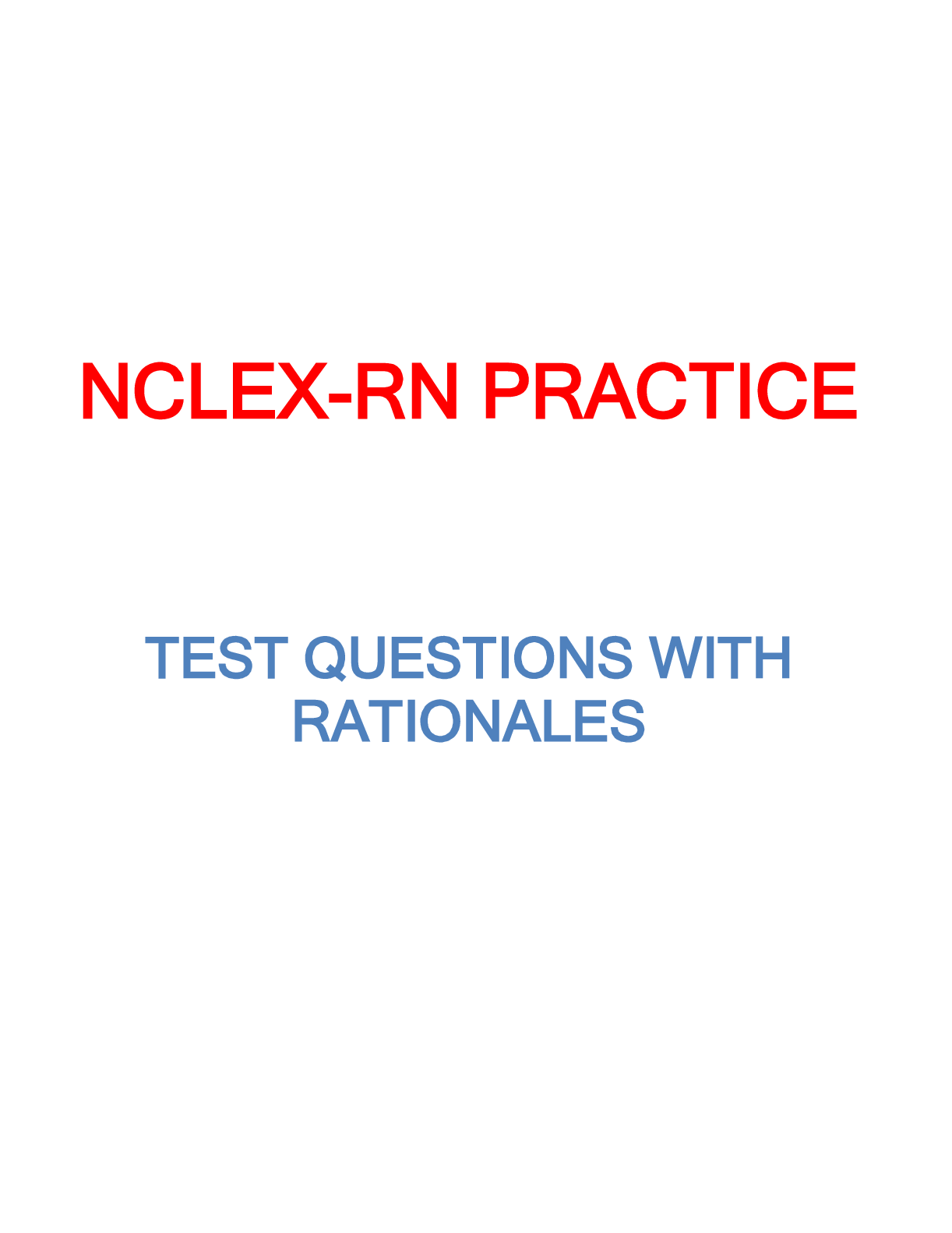
Reviews( 0 )
Document information
Connected school, study & course
About the document
Uploaded On
Sep 02, 2021
Number of pages
123
Written in
Additional information
This document has been written for:
Uploaded
Sep 02, 2021
Downloads
0
Views
45



